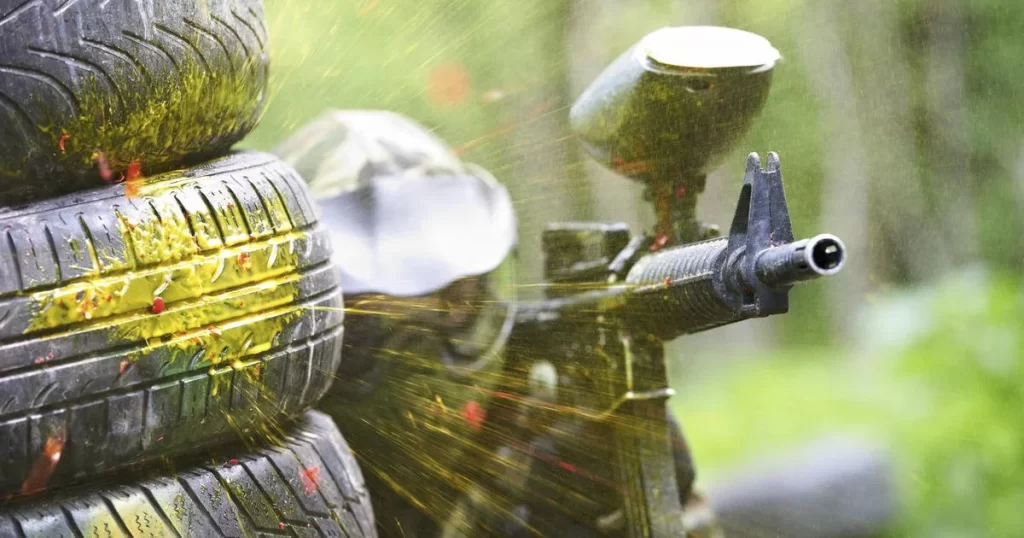Imagine this: you’re having a blast playing paintball with your friends, dodging colorful pellets and strategizing to take down the opposing team.
But suddenly, one of your opponents aims their paintball gun at you and pulls the trigger. Ouch.
You feel a sharp sting as the paintball hits your arm, leaving a bright red mark. But, Is It Illegal To Shoot a Paintball Gun at Someone?
In general, it is not illegal to shoot a paintball gun at someone, so long as you have their consent. This is because paintball guns are considered to be non-lethal weapons, and as such, are not subject to the same laws as firearms. However, there are potential consequences for shooting someone with a paintball gun without their consent.
For instance, if you shoot someone without their consent, you could be sued for battery. This is because paintball guns can cause pain and injury, even if the pellets themselves are not lethal. In addition, if you shoot someone without their consent, you could also be charged with assault. This is because paintball guns can be used as weapons, and assault is defined as the act of causing someone to fear for their safety.
In most states, shooting a paintball gun at someone is considered assault and battery. There are a few states that have specific laws on the books about paintball guns. For example, in Florida, it is illegal to shoot a paintball gun at someone without their consent. If you do so, you could be charged with a misdemeanor.
Therefore, while it is not technically illegal to shoot a paintball gun at someone, there are still potential consequences that you could face if you do so without their consent. It is always best to get the other person’s consent before shooting them with a paintball gun.
So, buckle up and get ready to learn more.
Table of Contents
- 1 Can You Legally Shoot a Paintball Gun at Someone?
- 2 Is a Paintball Considered a Weapon?
- 3 Can You Shoot Paintballs in a City?
- 4 Can You Shoot Paintballs on Your Property?
- 5 Can You Shoot a Paintball Gun at Trespassers?
- 6 Can You Shoot at Intruders?
- 7 How Effective Would a Paintball Gun Be in an Intruder Situation?
- 8 Conclusion
Can You Legally Shoot a Paintball Gun at Someone?
The legality of shooting a paintball gun at someone varies by state and city, and it is crucial to understand and comply with these laws to avoid potential legal issues.
Here is a detailed breakdown of the specific laws and regulations that apply to shooting a paintball gun at someone in the United States:
- Age Restrictions: In different states, there are varying minimum age requirements for purchasing or possessing a paintball gun, with some states even requiring a permit. To ensure compliance with the law, it is essential to check the laws in your specific area before purchasing or using a paintball gun.
- US Consumer Product Safety Commission Standards: The US Consumer Product Safety Commission has established safety standards for paintball guns, including velocity limits, safety features, and warning labels. To avoid legal issues, it is important to only purchase paintball guns that adhere to these standards.
- City/Municipal Ordinances: Many cities and municipalities have their own laws and regulations regarding paintball guns, such as restrictions on where they can be used and storage requirements. It is crucial to check the local laws before using a paintball gun.
- Consent: Shooting someone with a paintball gun without their consent can result in serious legal consequences, including charges of assault and battery. It is always best to obtain the other person’s consent before shooting them with a paintball gun.
- Safety Measures: When using a paintball gun, it is imperative to follow safety measures such as wearing proper protective gear, avoiding shooting too close or in an unsafe manner, and ensuring that the gun complies with safety standards.
By understanding and adhering to these laws and regulations, players can fully enjoy the sport of paintball without risking legal repercussions or causing harm to others.
It’s essential for players to be aware of these laws and regulations to ensure they are not breaking any rules while engaging in this popular sport. In addition to avoiding legal issues, following these guidelines can also help promote a safe and enjoyable environment for all players involved.
Although paintball is a thrilling and competitive activity, it’s important to remember that safety should always be the top priority. As with any sport or recreational activity, taking proper precautions and adhering to laws and regulations is crucial to ensuring a positive experience for everyone involved.
Is a Paintball Considered a Weapon?
Yes, a paintball gun can be classified as a weapon under certain circumstances. While it is not considered a firearm by the law, it does share some similarities with firearms and can therefore be treated as such by the law.
The legal implications of using a paintball gun to shoot at someone can vary depending on the situation. If the person being shot at is a consenting participant in a paintball game, then there are no legal issues. However, if the person being shot at did not consent or was not aware of the game, then it could be considered assault or even battery in some cases.
Furthermore, if the paintball gun is modified to increase its power or shooting speed, it could be deemed a dangerous weapon and result in more severe legal consequences. It is crucial to always follow the manufacturer’s guidelines and adhere to any local laws and regulations regarding paintball guns.
Below is a table outlining the key differences between paintball guns and firearms:
| Paintball Gun | Firearm |
| Uses air pressure to propel projectiles instead of explosive force | Utilizes the frame or receiver of a firearm rather than having its own structure |
| Not considered a firearm by law, but still has potential for harm if used improperly | Deemed a firearm by law and has lethal capabilities if handled incorrectly |
| Can cause injury if proper safety gear is not used while playing | Potentially lethal if proper safety measures are not taken while handling |
So, while paintball guns may not be classified as firearms, they should still be handled with caution and respect. It is vital to use them in a safe and responsible manner to avoid any legal consequences or potential harm to oneself or others.
Paintball guns may not have the same destructive power as firearms, but they should still be treated with the same level of responsibility and care. As with any weapon, proper usage and adherence to safety guidelines are crucial to prevent any harm or legal issues.
Can You Shoot Paintballs in a City?
In cities, there are laws and regulations that restrict the act of shooting paintballs at others. It’s important to abide by these laws to ensure safety and avoid any legal repercussions.
Here are some common restrictions and laws that apply to shooting paintballs in cities:
- Age Requirements: Most cities have age limits for participating in paintball activities. This is to ensure that minors are not involved without proper adult supervision. The minimum age requirement varies, but it’s typically around 18 years old.
- Equipment Regulations: Paintball guns must comply with safety standards and be approved for use within the city. This means using guns that are specifically designed for paintball and have not been altered or modified in any way. Furthermore, wearing protective gear such as masks and goggles is mandatory at all times.
- Safety Protocols: Both organizers and players must adhere to safety protocols to prevent accidents during gameplay. This includes proper handling of guns, playing in designated areas, and following safety instructions given by organizers.
- Legal Repercussions: Violating paintball restrictions can result in legal consequences, including fines and imprisonment. Therefore, it’s crucial to take these laws seriously to avoid any mishaps while having fun playing the game.
To summarize, it’s essential to always check local laws and restrictions when playing paintball in a city to ensure the safety and enjoyment of all players involved. Following these laws not only prevents legal consequences but also promotes responsible and respectful gameplay.
Can You Shoot Paintballs on Your Property?
The legality of shooting paintballs at someone on your own property can be a complicated issue, as it depends on the specific laws and circumstances of your city or state. It’s essential to have a good understanding of the regulations and laws surrounding paintball use on private property, as well as any potential legal consequences for using a paintball gun in self-defense.
Laws and Regulations for Paintball Use on Private Property
In most cities and states, there are no specific laws or regulations prohibiting shooting paintballs on your own property. However, there may be noise ordinances or zoning laws that limit when and where you can play paintball. It’s crucial to research and follow these laws to avoid any potential legal repercussions.
Furthermore, if you live in a residential area, there may be restrictions on using paintball guns due to safety concerns and disturbance to neighbors. In such cases, it’s best to check with your local government or homeowners’ association before setting up a paintball course on your property.
Using Paintball Guns in Self-Defense
As mentioned earlier, using a paintball gun during an armed robbery is considered an additional offense and can result in more severe legal consequences. However, if someone is breaking into your home or threatening bodily harm, using a paintball gun for self-defense may be justified.
In this situation, it’s essential to keep in mind that even though you may have acted in self-defense, you are still responsible for any injuries caused by the paintball gun. Therefore, it’s crucial to use caution and only use the necessary force to protect yourself.
Can You Shoot a Paintball Gun at Trespassers?
In most cases, it is considered trespassing if you shoot a paintball gun at someone on your property. While trespassing is typically classified as a misdemeanor offense, using a paintball gun on someone who is on your property can result in more serious charges, such as felony assault. To avoid potential legal consequences, it’s important to understand and adhere to local laws and regulations governing the use of paintball guns on private property. Furthermore, it’s crucial to exercise caution and only use deadly force in situations where you are legitimately afraid for your own life or the life of another person.
In certain scenarios, defending your property with a paintball gun may seem like an appealing option. However, it’s important to keep in mind that using any type of force on someone without a valid reason can lead to serious consequences. In some jurisdictions, even shooting a paintball gun at an intruder who is standing on your property could be considered excessive force.
To further complicate matters, the definition of “trespassing” can vary from location to location. While some places may consider someone stepping onto your property without permission as trespassing, others may require the individual to cause damage or disruption to be considered trespassing. It’s essential to understand these nuances and stay informed about the laws in your area.
In addition to understanding the legal implications of shooting a paintball gun at trespassers, it’s also crucial to have a clear understanding of when deadly force is justified. In most cases, deadly force should only be used when there is an immediate threat to life or serious bodily harm. If you shoot someone with a paintball gun without a valid reason, you could potentially face charges of assault or even murder.
Can You Shoot at Intruders?
Defending against intruders is a concern for many individuals, and using a paintball gun may seem like a viable option. However, whether or not this is legally allowed depends on your specific location. It’s vital to conduct thorough research and comprehend the self-defense and use of force laws in your country, state or province, and city.
In certain parts of the United States, non-lethal weapons such as paintball guns are permitted for self-defense; however, it must be reasonable and necessary in the given circumstances. On the contrary, countries like Canada and the UK do not consider paintball guns as an acceptable means of self-defense.
It’s important to note that using a paintball gun may escalate the situation and put the defender at higher risk. Proper training and practice are crucial when utilizing a paintball gun for self-defense. Additionally, it’s essential to use appropriate ammunition and protective gear.
How Effective Would a Paintball Gun Be in an Intruder Situation?
In certain scenarios, using a paintball gun for self-defense during an intruder situation may prove to be effective, however, it may not always be the most dependable choice.
These types of guns are primarily designed for leisurely activities and are not classified as lethal weapons, thus their effectiveness in deterring or stopping an attacker or intruder might be limited.
| Advantages of using a paintball gun for self-defense: | Disadvantages of using a paintball gun for self-defense: |
| – The impact and mess created by the paint pellets have the potential to discourage an attacker/intruder. – It may be less intimidating or fatal compared to other weapons, possibly preventing serious injury or death. – In some regions, it is considered a legal option for self-defense. – It can be utilized from a distance, providing some level of safety for the defender. – It is relatively affordable compared to other self-defense weapons. |
– Limited range and accuracy when compared to other weapons, making it less effective at long distances or in situations where precision is crucial. – Limited stopping power as paintball guns do not cause significant physical harm. – It could escalate the situation and put the defender in greater danger. – It could result in legal consequences if used outside of recreational activities in certain areas. – Proper training and practice are necessary to use the weapon safely and effectively. – If not used properly or with appropriate ammunition and protective gear, it could still cause serious injury or death. |
While there are potential advantages and disadvantages associated with using a paintball gun for self-defense, its effectiveness ultimately depends on the specific circumstances and the individual’s proficiency and training with the weapon.
It is crucial to understand that using a paintball gun for self-defense can have serious repercussions, both legally and physically.
Conclusion
In conclusion, the legality of shooting a paintball gun at someone is a multifaceted issue that varies depending on location.
It is imperative to have a thorough understanding and compliance with the laws and regulations surrounding this popular recreational activity, including age restrictions, consent, and safety measures. While paintball guns may not be classified as firearms, they should still be handled with care and respect, as they have the potential to cause harm if used recklessly.
When playing in cities or on private property, it is crucial to abide by local laws and regulations to ensure the safety of all players involved. And in situations where self-defense may be necessary, it is vital to exercise caution and use deadly force only as a last resort.
By having a deep understanding of these laws and adhering to safety guidelines, players can fully enjoy the exhilarating sport of paintball without risking legal consequences or causing harm to others.






